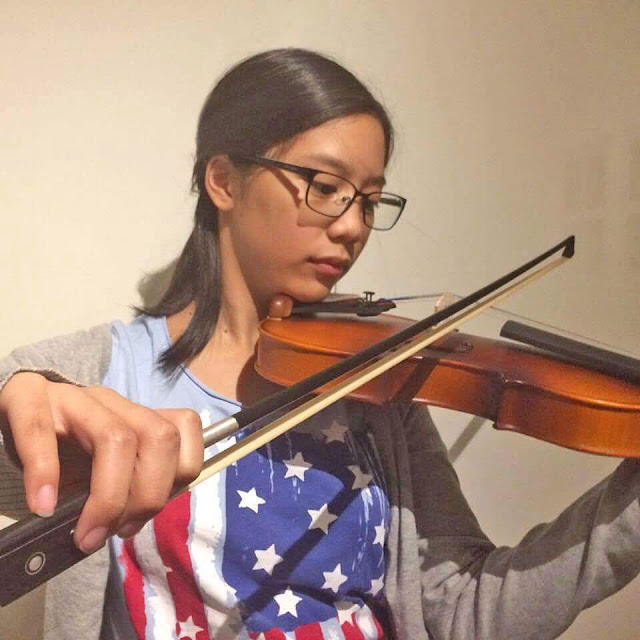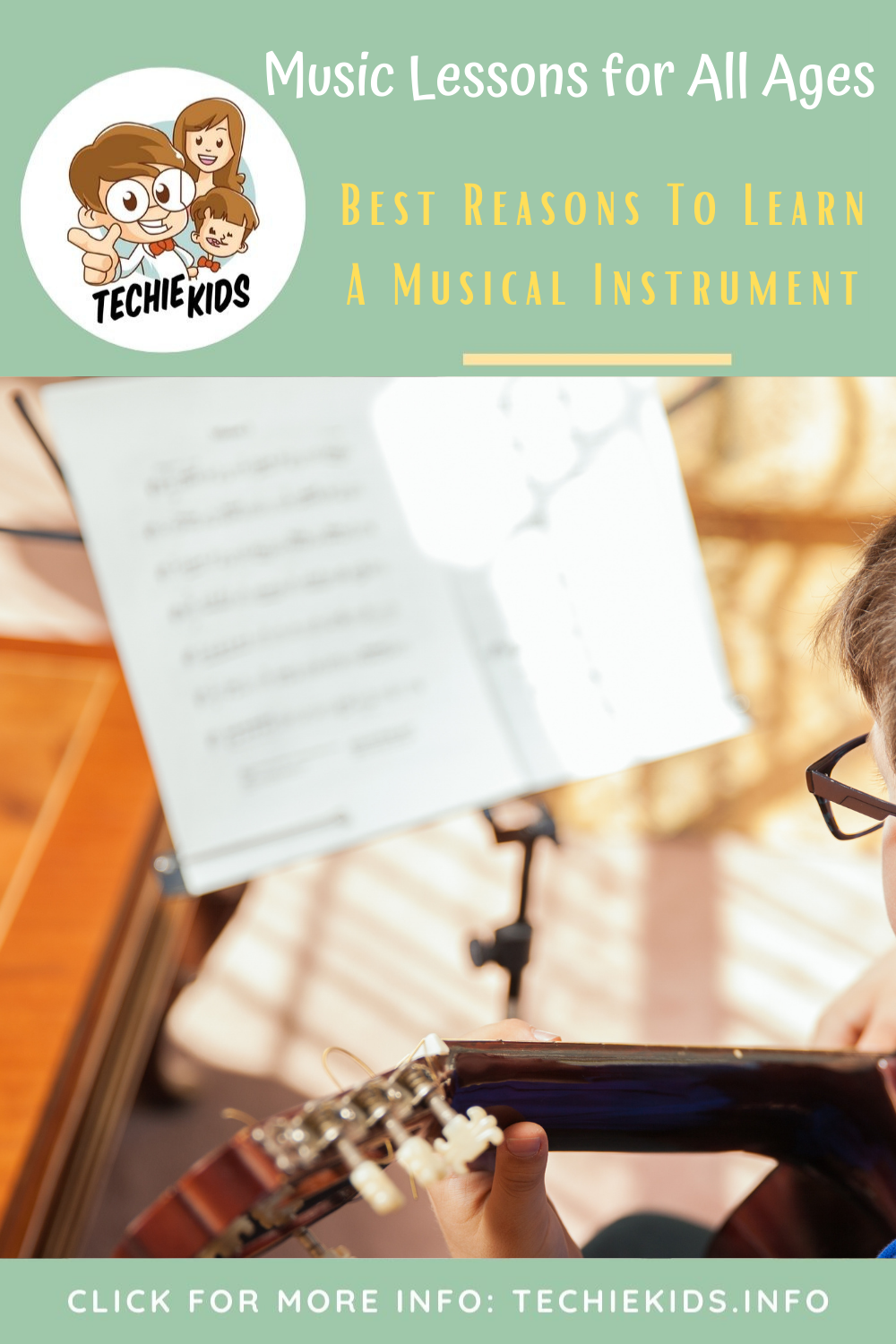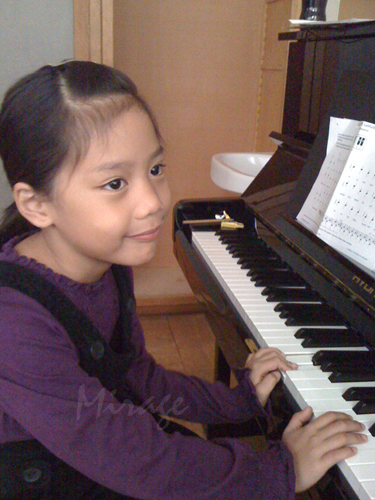
Music Lessons for All Ages: dear daughter and her violin
When our daughter was younger, she would try everything she sets her mind to. She wanted to learn the flute, so she did. She then wanted to learn how to play the piano, so she did. Then, she wanted to do jazz dance, and so she did. She was even in a play at Vienna’s Akademietheater at one point, even though it was for a no-dialogue character.
Most of these were after school lessons, I would take her (with 2 boys along) to the classes and we would wait for her to finish. Sometimes, son no.1 would go and sit behind her to watch her play the piano (sometimes annoy her too). I asked the boys if they would also like to learn how to play the piano, but they declined. Later on, they would learn how to read notes and music sheets because dear daughter would teach them and show them how to play the keyboard. We later realized that our youngest can play by ear.
Today, our daughter has been focusing on learning the violin, but she’s actually an art student (and art is beneficial too). While it’s not a surprise that she is in this direction (Dad is an artist), she never really asked us to enroll her in art lessons as a child.
French-German Nobel Peace Prize winner and musicologist Albert Schweitzer once said, “There are only two means of refuge from the miseries of life: Music and Cats!” Depending on where you stand, you might say it’s music and dogs, music and plants, music and God. And you’re not wrong…music will always be one of the two.
While there are those born with the talent to play music by ear, learning and taking music lessons will enhance that skill resulting to being able to play more accurately. Here are some of the best reasons why you should learn an instrument, regardless of wind, percussion, string, brass, or keyboard. If you prefer to take voice lessons, that’s ok too.

Music Lessons for All Ages : practicing violin
Table of Contents
Brain exercise
Music has scientifically been proven to have a good effect on our brains, whether when listening to it or playing it. Music provides a total brain workout, says John Hopkins researchers. Here are some of the established effects music has on the brain.
Improves memory
Studies show that music activates both sides of the brain, maximizing one’s ability to learn and improve memory. Music is, the last thing we forget. Last song syndrome? Yes, even if you’ve heard that song 2 days ago you’ll burst out singing to its tune without even consciously doing so.
Even Alzheimer’s and Dementia cannot take music away from those suffering to these. See this former ballerina with Alzheimer’s react to “Swan Lake.”
Improves listening skills
As said, music helps improve one’s memory and it follows that it also helps improve one’s listening skills. The auditory cortex is responsible in recognizing and understanding pitch and tone, playing and listening to music mean using it continuously, and like muscle memory, the more it is used, the better it performs.
Enhances ability to focus
Music needs not only attention when learning it, it needs comprehension, structural understanding, and the ability to put these together. Your brain needs to do so many processes of thinking to make sense of how music is made – beginning from seeing the notes, hearing the sounds, and knowing which key to tap. Muscle memory also comes to play, once you’ve learned how to play a piece, your muscle nerves react to the repetitive movement as you practice.
Is correlated with improved academic performance
As music improves memory, listening, and the ability to focus, it’s no wonder too that when combined, it results to better academic performance. Overall, one’s cognitive skills – the core skills the brain uses to think, read, learn, remember, reason, and pay attention is enhanced when music is involved.

Music Lessons for All Ages – 9 Best Reasons To Learn A Musical Instrument – frustrated with a xylophone (he was 2 years old)
Self-Discovery
Through music, one gets to discover what he likes (type of music for example), what he enjoys, what he may not be happy about, and one even gets to learn what he is capable of. On knowing that one can play a piece of music, it boosts confidence that others things can be learned as well.
Boosts Self-esteem
Music also has the capacity to better our mood, in effect reduces fatigue. Depending on the type of music one listens to or play, it can motivate in many ways. When one is in a good mood, is motivated, it also results to confidence trickling down to many other positive aspects of life.
Teaches Patience and Discipline
The discipline involved in learning a musical instrument or having voice lessons teaches kids patience. They learn about the step by step process of getting into playing a whole piece of music. Putting what they learn into practice from each lesson makes them see that patience to listen, concentrate, to understand, and sometimes being scolded are worth it.
A Possible Creative Career
While some plays music as a hobby, others ends up in the music industry – in its many careers and practices. Music producers, concert planners, music agents, owning a music venue, talent managers, and many others help musicians succeed in their respective professions.
Develop Social Skills
Aside from developing patience, learning music with a group will teach kids how to show respect. They’d be there too seeing others play while waiting their turns to play their part. They also get to know people who loves music and can have long-lasting friendships bonded with a common interest.

Music Lessons for All Ages : youngest playing
Improves Language Learning
Listening is also a language skill. I listened to a lot of German songs to improve my vocabulary and learn how words are pronounced, and this has been the same with learning Japanese and Spanish. It is more enjoyable to be familiar with a language through singing and listening to songs in the language you want to learn.
Understanding Culture and History
The history of music all around the world is very rich. For many generations, music has become a form of expression that offers all of us a way to communicate across cultures and regions. World-renowned bands and singers are proof that people from all-over and different generations can be in agreement when it comes to music. (Hello Beatles, Michael Jackson, Aretha Franklin, Bob Dylan, Madonna, Lea Salonga, Pink, Spice Girls, One Direction, BTS.) Music and music lessons for all ages transcends generations, race, and regions.

Pin this! (Music Lessons for All Ages – 9 Best Reasons To Learn A Musical Instrument)
A Place of Comfort
In these trying times, as we are faced with uncertainty, music is and will be a saving grace we need to keep our sanity.
Music can turn a bad day into a good one, studies show that music releases the happiness hormone, dopamine, and the mood-regulator hormone, serotonin. Yes, as negative as this may sound, music stimulates the same reward system area in the brain as would alcohol and illegal drugs. Take that in a good way though, why would you do drugs when there’s music that doesn’t only calm and put you into good mood, it enhances many of your brain functions to be a productive and creative individual?
Fun, Joy, and Lasting Memories
Music opens one’s memory vault to relive the happy and also not-so fond experiences they associate with songs and music pieces. And it is never too late to learn, whether online, in person, there will be music lessons for all ages – wherever part of the world we are based.
When learning music instruments you collect experiences that will make you look back and remember how you worked hard to be able to play that certain piece. The frustration you felt if you can’t play properly, and the satisfaction of having to perform in front of a big audience.
Music evoke emotions…and one of the most important among those is joy – a state of happiness that remains no matter if the conditions around us are pleasant or not.

Music Lessons for All Ages – 9 Best Reasons To Learn A Musical Instrument : Siblings bond





Wow, this is such a really great and very informative post! My son really love’s playing guitar! He even performed in their school.
That’s cool! My kids love music too – it’s worth taking those lessons…
Both of my girls play music, and it is such a great part of their education. It was always important for me to include music in their lives.
Music gives us calm, I’m sure they would thrive more in music! 🙂